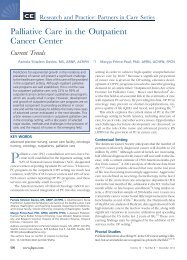social work practice and the law - Springer Publishing
social work practice and the law - Springer Publishing
social work practice and the law - Springer Publishing
You also want an ePaper? Increase the reach of your titles
YUMPU automatically turns print PDFs into web optimized ePapers that Google loves.
Preface<br />
xi<br />
<strong>and</strong> to respond to legal issues, <strong>and</strong> to respect <strong>and</strong> activate <strong>the</strong> rights of<br />
your clients. The <strong>law</strong>yer/author will also instruct you on how to obtain legal<br />
guidance <strong>and</strong> expertise when you as a <strong>social</strong> <strong>work</strong>er do not have direct<br />
access to a <strong>law</strong>yer.<br />
Many of <strong>the</strong> ideas in this book are informed by evaluation research conducted<br />
by <strong>the</strong> <strong>social</strong> <strong>work</strong>er/author that sought to identify <strong>and</strong> describe <strong>practice</strong><br />
<strong>and</strong> educational activities that can result in more effective collaboration<br />
between <strong>social</strong> <strong>work</strong>ers <strong>and</strong> <strong>law</strong>yers, challenge <strong>and</strong> modify professional<br />
stereotypes <strong>and</strong> greater feelings of empowerment <strong>and</strong> competence for <strong>social</strong><br />
<strong>work</strong>ers that <strong>work</strong> within legal forums. This book represents our belief <strong>and</strong><br />
<strong>the</strong> contemporary view of policy makers, that interprofessional dialogue <strong>and</strong><br />
problem solving results in more comprehensive <strong>and</strong> creative solutions for<br />
client problems <strong>and</strong> consequently <strong>the</strong> development of more effective <strong>and</strong><br />
just <strong>law</strong>s, justice systems, <strong>and</strong> <strong>social</strong> services.<br />
The book begins by identifying <strong>the</strong> legal needs of <strong>social</strong> <strong>work</strong> clients, with<br />
particular focus on low-income populations. We follow this with a conceptual<br />
<strong>and</strong> historical frame<strong>work</strong> that provides a base for <strong>social</strong> <strong>work</strong>ers from which to<br />
rethink <strong>the</strong>ir relationship to <strong>the</strong> <strong>law</strong>. Chapters 4, 5, <strong>and</strong> 6 provide <strong>the</strong> basic<br />
knowledge, values, skills, <strong>and</strong> ethics needed to become a critically competent<br />
practitioner including: ethical differences <strong>and</strong> similarities between <strong>the</strong> profession,<br />
an overview of both <strong>the</strong> implicit <strong>and</strong> explicit legal contexts, essential<br />
critical thinking skills, <strong>and</strong> basic skills of legal <strong>and</strong> <strong>social</strong> science research.<br />
Chapters 6 <strong>and</strong> 9 present an in-depth review of a range of civil proceedings,<br />
<strong>the</strong> path of a civil case <strong>and</strong> stress <strong>the</strong> areas where <strong>the</strong>re is an intersection<br />
between <strong>law</strong> <strong>and</strong> <strong>social</strong> <strong>work</strong> as well as identify legal decisions that often<br />
require <strong>social</strong> <strong>work</strong> knowledge. Chapters 7 <strong>and</strong> 10 cover criminal <strong>and</strong> juvenile<br />
justice proceedings, <strong>the</strong> path of a criminal <strong>and</strong> juvenile case, <strong>and</strong> <strong>the</strong> many<br />
opportunities for <strong>social</strong> <strong>work</strong> intervention with a focus on prevention.<br />
Chapter 8 deals with <strong>the</strong> basic skills <strong>and</strong> knowledge that a <strong>social</strong> <strong>work</strong>er<br />
will need to effectively participate in a trial or hearing, including such topics<br />
as witness preparation, what to expect, report writing, <strong>and</strong> expert testimony.<br />
Chapter 11 describes <strong>the</strong> many alternative venues available to traditional<br />
adversarial proceedings such as mediation, family group conferencing, <strong>and</strong><br />
problem-solving courts.<br />
In Chapter 12, <strong>social</strong> <strong>work</strong>ers will learn about administrative <strong>law</strong> <strong>and</strong><br />
<strong>the</strong> path of an impartial hearing <strong>and</strong> come to underst<strong>and</strong> how administrative<br />
<strong>law</strong> is especially relevant to <strong>social</strong> <strong>work</strong> <strong>practice</strong>. Finally, Chapter 13 introduces<br />
<strong>the</strong> reader to <strong>the</strong> opportunities for collaboration on a more macro<br />
level, such as participation in class action <strong>law</strong>suits, civil rights litigation, <strong>and</strong><br />
<strong>the</strong> submission of amicus briefs.
















